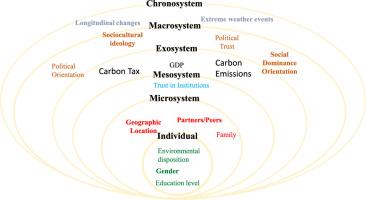Understanding climate change attitudes in Europe: A systematic review using social ecological framework
IF 2.2
Current research in ecological and social psychology
Pub Date : 2025-01-01
DOI:10.1016/j.cresp.2025.100245
引用次数: 0
Abstract
Understanding climate change attitudes is key to addressing the most significant challenge of our time. This paper outlines a pre-registered systematic review (https://www.crd.york.ac.uk/PROSPERO/view/445108) which uses Bronfenbrenner’s Bioecological Systems Theory to examine the academic literature on person-centred social influences of climate change attitudes in Europe. After screening 4554 articles from four databases, we identified and synthesised data from 93 studies conducted in Europe. Across Europe, there is a high level of concern and belief in climate change. While we found that there are factors at multiple levels which appear to influence attitudes toward climate change, many of the findings are mixed, and the quality of evidence is relatively weak. Most included studies used a cross-sectional survey design. The available evidence suggests that no single factor explains the diversity of views on this critical issue, and instead climate change attitudes result from a dynamic interplay between demographic factors, proximal influences, and broader socio political orientations. If we really want to understand what predicts attitudes toward climate change in Europe, there is a clear need for more rigorous, longitudinal research; such research would deepen our understanding of how climate change attitudes evolve over time and are influenced by changing political, social, and environmental conditions.

理解欧洲对气候变化的态度:基于社会生态框架的系统回顾
了解对气候变化的态度是解决我们这个时代最重大挑战的关键。本文概述了一项预先注册的系统综述(https://www.crd.york.ac.uk/PROSPERO/view/445108),该综述使用Bronfenbrenner的生物生态系统理论来研究欧洲气候变化态度对以人为中心的社会影响的学术文献。在筛选了来自4个数据库的4554篇文章后,我们确定并综合了在欧洲进行的93项研究的数据。在整个欧洲,人们对气候变化有着高度的关注和信仰。虽然我们发现,似乎有多个层面的因素影响人们对气候变化的态度,但许多发现是混杂的,证据的质量相对较弱。大多数纳入的研究采用了横断面调查设计。现有证据表明,没有单一因素可以解释对这一关键问题的不同看法,相反,对气候变化的态度是人口因素、近端影响和更广泛的社会政治取向之间动态相互作用的结果。如果我们真的想了解是什么预测了欧洲人对气候变化的态度,显然有必要进行更严格的纵向研究;这样的研究将加深我们对气候变化态度如何随时间演变的理解,以及如何受到不断变化的政治、社会和环境条件的影响。
本文章由计算机程序翻译,如有差异,请以英文原文为准。
求助全文
约1分钟内获得全文
求助全文
来源期刊

Current research in ecological and social psychology
Social Psychology
CiteScore
1.70
自引率
0.00%
发文量
0
审稿时长
140 days
 求助内容:
求助内容: 应助结果提醒方式:
应助结果提醒方式:


